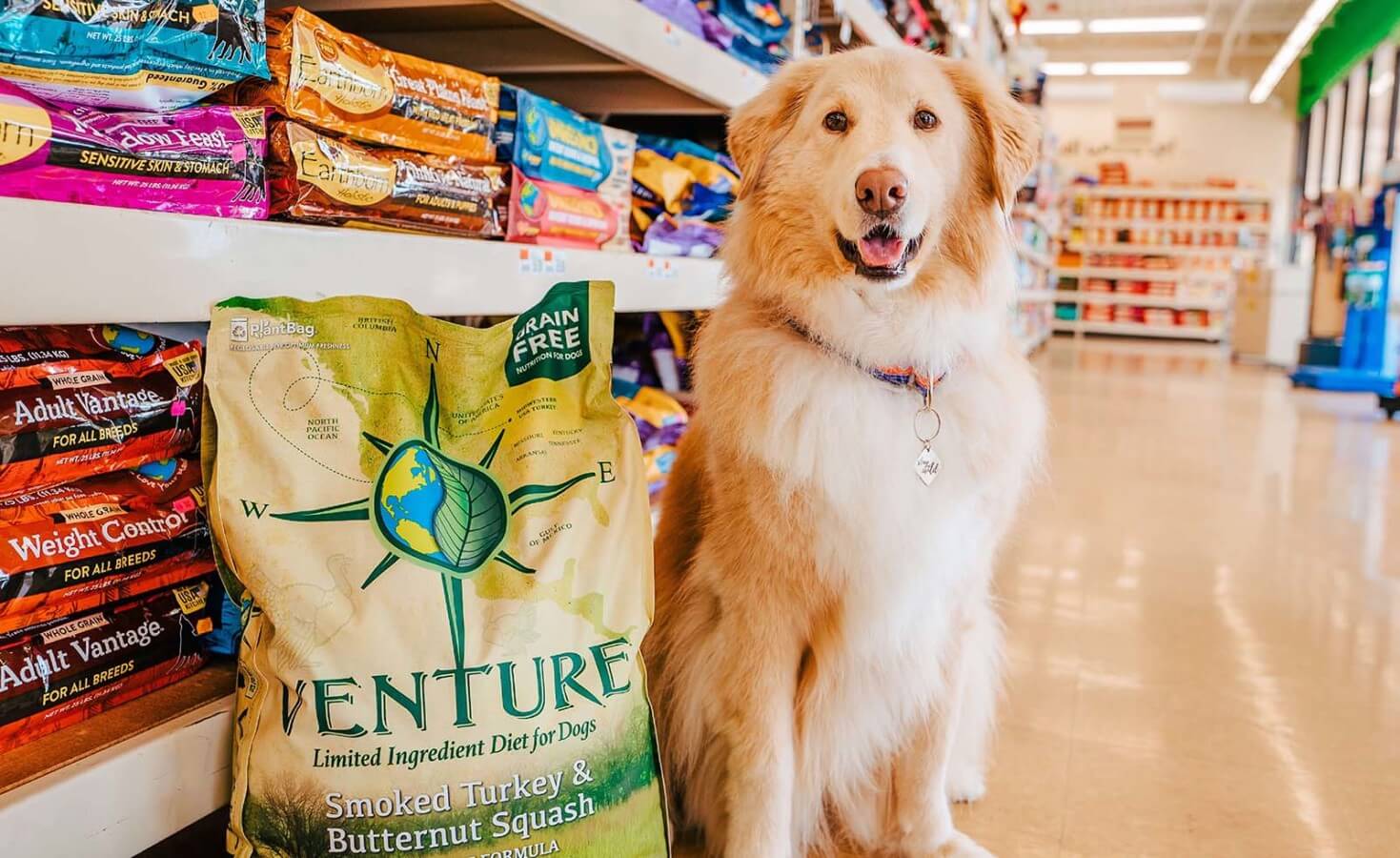From Puppy to Senior Dog: Choosing Food to Help Avoid Allergens
When you have a dog with allergies, finding dog food to provide them relief can seem like a constant struggle. While figuring out what exactly your dog or puppy is allergic to is often half the battle, learning the ins and outs of dog food for allergies and the benefits they can provide your dog or puppy can be overwhelming. Luckily, we’ve rounded up everything to look for so you can provide your dog of any age a healthy meal.

Symptoms of Dog Allergies
“Why is my dog itching so much?” “Why does my dog have dry flaky skin and scabs?” “Does my dog have allergies?” If your dog is experiencing annoying, uncomfortable symptoms, there’s a chance they may be dealing with allergies. Whether you’re dealing with food allergens, environmental allergens, or no allergens at all, this can be the start of a sometimes lengthy road to relief, as dog food allergy symptoms and dog seasonal allergy symptoms can look extremely similar. For this reason, working with your vet to determine if your dog is in fact dealing with allergies or if it’s even another completely different health issue is super important.
According to AKC, if your dog is showing any of the following dog allergy symptoms or is even just not acting quite right, consider making a trip to your vet to see if allergies may be the culprit:
- Itchiness
- Hives
- Swelling of the face, ears, lips, eyelids, or earflaps
- Red, inflamed skin
- Diarrhea
- Vomiting
- Sneezing
- Itchy ears
- Chronic ear infections
- Itchy, runny eyes
- Constant licking
If you take your dog to the vet because you think they may have allergies, your vet may recommend allergy testing or an elimination diet to determine what exactly your dog is allergic to. Before you go to the vet, be sure to make note of when you notice their symptoms occurring, since these notes and observations can help your vet develop a course of action to help your dog feel better.
For example, if you notice your dog’s symptoms are more seasonal and don’t seem to have an association with their food, your vet may want to do allergy testing for seasonal allergies instead of an elimination diet. If your dog’s allergies are more consistent, they may try an elimination diet first to make sure it’s not an ingredient in your dog’s food that’s causing the issue. Any notes you can give your vet before starting any kind of treatment helps, so be sure to pay attention to these things as well.
Common Puppy Allergies
While dog allergies can be difficult to deal with and keep under control, puppy allergies bring a whole new set of complications. Since puppies have different nutritional requirements than adult dogs to keep up with their quick growth, finding a puppy food for allergies usually comes with more limited options. But how do you know if you should look into finding an allergy-friendly food for your puppy? Here are some of the most common symptoms of allergies in puppies:
- Puppy dry skin
- Puppy sneezing
- Puppy licking paws
- Rash on puppy’s belly
If your puppy is experiencing these symptoms, it still may be a good idea to discuss with your veterinarian to confirm the cause is an allergy and not an underlying health condition that may require a different treatment. If an allergy is confirmed, rest assured that there are several puppy-friendly food options that we’ll discuss later that can help!
Common Allergies for Senior Dogs
When it comes to dogs, it’s not just puppies that can develop allergies and sensitivities. While it’s not quite as common, senior dogs can develop allergies, too. When it comes to allergies, dog itchy skin is usually the symptom that pet owners notice first. If you notice your senior starting to itch more than normal or have any other allergy symptoms, it won’t hurt to take them to your vet to see if allergies are the culprit.
If your vet determines that your dog does in fact have allergies, you may be looking for the best senior dog food for allergies. To find this, it’s important to first understand what you should be looking for in a senior dog food in general. Low fat, low calories, and added glucosamine and chondroitin sulfate are all things that you should be paying attention to when choosing food for your senior dog–whether they have allergies or not.
A question you may be wondering is, “How old is a senior dog?” While it varies a lot depending on your dog’s breed, it also depends on how old dogs can live. Smaller dogs typically have a longer life expectancy, so they aren’t usually considered seniors until they reach 11 or 12 years old. Large breeds, on the other hand, are usually considered seniors closer to 8 years old. That being said, every dog is still different so make sure to check with your vet to determine when you should start looking for a senior food.
Best Wet Dog Food for Senior Dogs
While Weight Control might be our top pick for senior dogs, not all seniors are able to eat dry dog food. Some seniors develop dental issues as they age which can make it hard to chew crunchy kibbles. In these cases, wet dog food is the next best option. While our K95 recipes are great wet food options, they don’t have added glucosamine and chondroitin that seniors need. However, chicken is actually a naturally occurring source of glucosamine and chondroitin, so if you’re looking for a wet dog food for seniors, our K95 Chicken recipe is a great and tasty option.
Another option would be to use the wet dog food as a mixer or topper for your senior dog’s favorite kibble. The wet food helps soften the kibble and enhances the flavor even more for dinnertime. Since both options have different nutritional values, it’s important to adjust the feeding amounts to make sure you aren’t going over your dog’s daily caloric needs. If you’re unsure about how much of each you should feed, you can check with your vet.

Can Dogs Have Seasonal Allergies?
Now that we know dogs can be allergic to some foods like people, you may also be wondering–do dogs get seasonal allergies? The answer is yes, but according to Chewy dog seasonal allergies may different than you thought:
“With animals, it can be challenging to know if the allergy is from pollen or from something else, says Dr. Stewart. For instance, fleas and mites may be more of a nuisance during certain times of year, depending upon where you live, which make them seasonal allergens. ‘If your pet’s allergies are due to pollen from trees, grasses or weeds, the time of year they’ll crop up also depends on location,’ says Dr. Stewart. For instance, in Los Angeles, pollen can be airborne 10 months a year, from January through October, while the season is much shorter in New England. ‘If it comes and goes at a specific time every year, that information will help your veterinarian determine the cause of the allergy,’ says Dr. Stewart.”
Here are some of the most common dog seasonal allergy symptoms:
- Itching and scratching
- Sneezing
- Licking their paws
- Shaking their head often
- Redness or bumps on skin
- Skin irritation
If you notice your dog starts experiencing any of these symptoms, it’s a good idea to visit your veterinarian. Over the counter allergy medicine for dogs like Benadryl isn’t a recommended treatment unless your vet specifically instructs you to use it. That being said, your vet will likely recommend other solutions first such as anti-itch shampoos, allergy supplements, immunotherapy injections, and wiping your dog’s paws after being outside. Depending on the allergen causing the reaction, allergy relief for dogs may include prescription medicine prescribed by your dog’s vet.
Dog Breeds That Are Prone to Allergies
According to Merck Veterinary Manual, there are several breeds that are predisposed to developing allergies:
- Chinese Shar-Peis
- Wirehaired Fox Terriers
- Golden Retrievers
- Dalmatians
- Boxers
- Boston Terriers
- Labrador Retrievers
- Lhasa Apsos
- Scottish Terriers
- Shih Tzus
- West Highland White Terriers
That being said, every dog breed and even mixed breeds have the potential to develop allergies. Whether you have a boxer dog breed or a breed that isn’t on this list, your dog still has a chance of developing allergies. If you suspect your dog may have allergies, definitely check in with your vet.
What Causes Food Allergies in Dogs?
The thing that causes common dog food allergies is the pet’s immune system. Dr. Anne Huss, Earthborn Holistic’s Director of Nutrition Services, tells us that a food allergy is a result of a flaw in a pet’s immune system and is an abnormal reaction to normal foods: “In some cases, a pet’s immune system can misidentify or misjudge safe compounds (usually proteins) as a threat which causes the body to attack–leading to a food allergy.” In turn, this attack causes symptoms mentioned earlier like dog upset stomach, diarrhea, dog indigestion, and more.
On the other hand is a dog food intolerance. According to Dr. Anne, food intolerances can be either an unusual reaction to normal food or normal reactions to abnormal foods that do not trigger a response from the immune system. For example, if your dog happens to get into the trash and eats spoiled food, the resulting vomiting and/or diarrhea would be considered a normal reaction to an abnormal food not due to a response from the immune system.
Chicken allergy in dogs, grain allergy in dogs, and beef allergy in dogs are all relatively common dog food allergies that some pet parents have to pay attention to and avoid when choosing a food. Because chicken, beef, and grains are all ingredients that dogs are commonly exposed to, the chances of them developing allergies to them are higher.
What Can I Feed My Puppy With Allergies?
When looking for puppy food for allergies, you’ll want to make sure you’re paying close attention to the pet food label and looking for things that indicate the recipe is made for puppies. Puppies have different nutritional requirements than adult dogs so it’s important to make sure the food you pick not only is compatible with their allergies, but their quickly-growing body as well.
With any dog food (but especially puppy food) you’ll want to check the label on the back of the bag and look for the AAFCO statement, or nutritional adequacy statement. For puppy food, the statement should include “growth”. For example, here is the nutritional adequacy statement for our Coastal Catch recipe:
Earthborn Holistic Coastal Catch is formulated to meet the nutritional levels established by the AAFCO Dog Food Nutrient Profiles for growth, gestation and lactation, including growth of large size dogs (70 lbs. or more as an adult).
This statement confirms that this dry dog food recipe is complete and balanced and has all of the nutrients necessary for your puppy’s growth and development. In other words, an average puppy can eat Puppy Vantage as a healthy diet without the need for additional dog supplements.
Another thing that you may be looking for for your puppy is all life stages dog food. These recipes offer more flexibility for families with multiple dogs and decrease the need to switch to an adult recipe as your puppy gets older. All life stages recipes have a nutritional adequacy statement similar to our Venture Roasted Rabbit & Pumpkin recipe:
Earthborn Holistic Venture Rabbit Meal & Pumpkin is formulated to meet the nutritional levels established by the AAFCO Dog Food Nutrient Profiles for all life stages excluding growth of large size dogs (70 lb. or more as an adult).
This means that Venture Roasted Rabbit is complete and balanced and you’re able to feed this food to your dog for their whole life (puppy years included!) because it has all the necessary nutrients for each life stage. Our Venture Alaska Pollock Meal & Pumpkin recipe is also all life stages and is another great taurine-enriched, limited-ingredient option for your puppy with allergies.

What Can I Feed My Adult Dog With Allergies?
If you’re looking for dog food for allergies for your adult dog, there are a few things to keep in mind. A limited ingredient diet like our Venture recipes is a great option, but they’re not always necessary if you know exactly what your dog is allergic to. For example, if you know your dog has a food intolerance to chicken, you don’t necessarily need a limited ingredient diet–a chicken-free dog food should do the trick. Dog food like our Unrefined recipes, for example, aren’t limited ingredient diets but are chicken-free so they make great options for dogs with chicken allergies or intolerances.
If your dog doesn’t have specific food allergies but instead has skin allergies, you may look into a fish-based food for allergies. The best dog food for skin allergies typically uses a fish protein because fish is rich in Omega-3 fatty acids and Omega-6 fatty acids which are known to support skin and coat health. By finding a fish-based recipe like our Venture Alaska Pollock Meal & Pumpkin or Coastal Catch which is crafted with sensitive skin and stomach in mind, you can help your dog get a little relief from their skin allergies and sensitivities.
While a hypoallergenic dog food is an option, these recipes are often pricey prescription diets that are made with not-so-exciting ingredients (corn starch, anyone?). Hypoallergenic recipes are typically made with hydrolyzed proteins–often soy–that are made to bypass your dog’s immune response. If you can pinpoint your dog’s allergy and can avoid it, a limited ingredient dog food will usually be a great option instead and can provide your dog with an animal protein source. That being said, always be sure to check with your vet and discuss your options before switching your dog away from a prescription food.
What Can I Feed My Senior Dog With Allergies?
If you’re looking for the best dog food for senior dogs but your senior has allergies, there are a few more things you’ll need to look for when searching for the best dog food for senior dogs.
Low Fat Dog Food
One of the big things to look for when searching for the best senior dog food is low fat content. As dogs age, their metabolisms tend to slow down and they become more susceptible to weight gain. For this reason, our Weight Control recipe is our most recommended recipe for senior dogs. It has a very low fat and calorie content that helps your dog from putting on unwanted pounds as their metabolism slows.
Glucosamine & Chondroitin
Glucosamine and chondroitin sulfate are two things to check your dog food label for when looking for senior dog food. Glucosamine and chondroitin for dogs are two compounds that help support your dog’s joint health and are super important for seniors. Just like humans, as your dog ages their joints naturally tend to deteriorate and can make it harder for your dog to get around. By making sure their diet contains added glucosamine and chondroitin, you can make sure their joints are getting the support they need.
Best Senior Dog Food for Allergies
If your senior has allergies, you’re a little more limited on what you can feed them. If they’re not allergic to poultry, our Weight Control or K95 Chicken recipes are our top picks for seniors. If your vet determines that poultry is the culprit of your dog’s allergies, you’ll need to find a different option. In these cases, our Coastal Catch is our next best senior dog food for allergies.
Coastal Catch is made with Herring meal as the first ingredient and has balanced Omegas, making it a great option for the best dog food for skin allergies. This fish-based dog food for allergies has lower fat and calorie levels to keep your senior dog’s joints supported as they continue to age.
In the end, allergies aren’t fun for dogs of any age. Determining what exactly your dog or puppy is allergic to and working with your vet to develop a plan to treat their allergies are super important. In the case of food allergies, something as simple as a change in protein can work wonders when it comes to finding your dog some relief. Understanding your dog’s nutritional needs and then working around those requirements to find a food to match is a great start. With a little help from your vet, your dog with allergies can be feeling better in no time.




